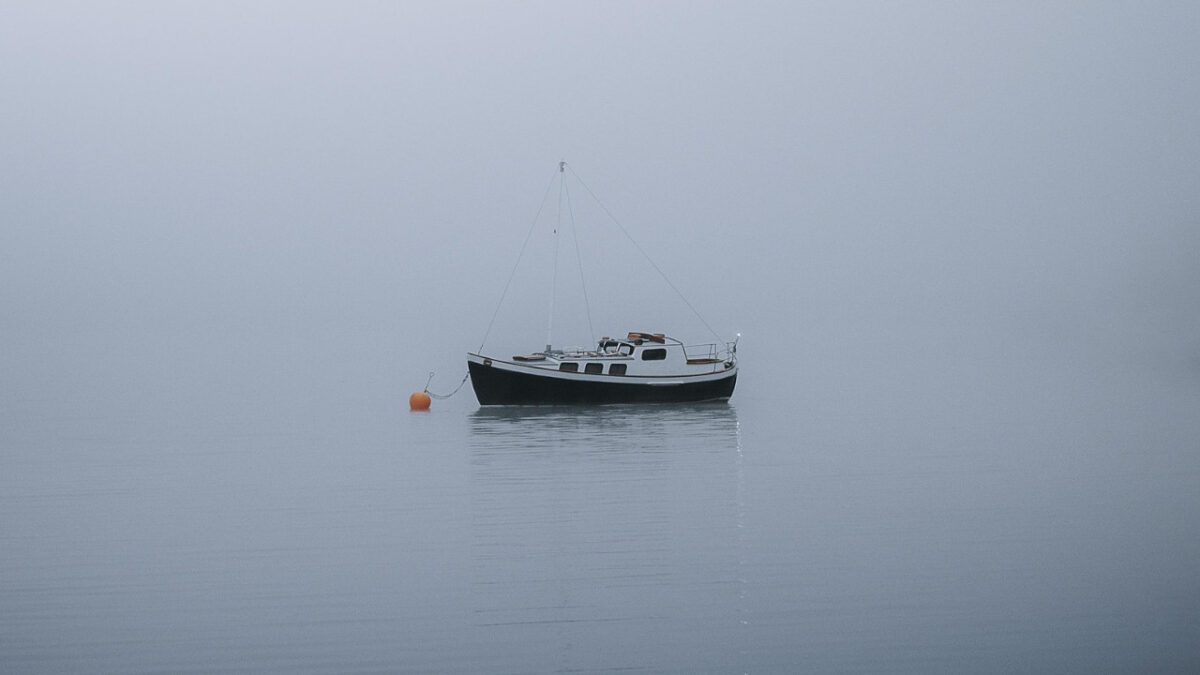Today, Lynn and I sit on our patio, 126 feet above Skagit Bay on Blowers Bluff, Whidbey Island. A thirty-mile-long fog bank rolls across the water from south to north. On dry land, we feel safe and secure. We know exactly where we are, though the fog obscures whatever is directly in front of us on the water. I listen for foghorns and bells, but the bay remains eerily silent. In dense fog, sound travels less far. Either the water is empty, or more likely, Dungeness crab fishermen are today relying on GPS, AIS, and radar aboard their boats.
For four years, I sailed the Eastern Seaboard with Master Chief Fred Wright, whom I met on the USS Virginia. Fred guided me through qualifying as Officer of the Day Underway, a process that taught me everything about our ship—from bridge to brow. In 1976–78, the most advanced navigation tool we had was SAT NAV, precise to about ten yards. Yet, for a large ship in a narrow channel, that wasn’t accurate enough. We also used sonar, radar, and handheld doppler devices to measure distances in fog—if the crew was trained. Back then, bringing a big ship into a small channel meant waiting for the fog to lift. That tradition still holds today for the most part.
Since the start of maritime exploration, navigators have faced the same questions: Where am I? Where are other vessels? Where are the dangers—shoals, dry land? Does my course put me at risk? When I first sailed the San Juan Islands and the Strait of Georgia forty years ago, we had radar, sonar, and Loran Charlie—a long-range radio navigation system. For small boats in open water, LORAN was adequate, but close to shore, signals were unreliable, making accurate navigation in poor visibility a challenge. Out of caution, my family and I avoided those uncertain conditions whenever possible.
As I write, the fog lifts and Camano Island appears six miles away. Several crabbers and two recreational sailboats are out on the water. They likely rely on GPS and AIS, far more advanced than what we had in 1978. Modern technology gives today’s mariners certainty about location and surroundings. This security was unknown to the sailors of the past—the Phoenicians, Vikings, and countless others.
The point is this: Accurate navigation requires trustworthy information. In today’s world, the moral and ethical pillars that have guided us for centuries are being abandoned by a secular elite, intent on inducing chaos, like a tempest at sea. These pillars, rooted in Biblical and Natural Law, are our cultural GPS and AIS, helping us rise above the fog of relativism and situational ethics.
Progressive ideologies, in my view, often fail to recognize the tools that brought society forward. Applying Classical Western and Biblical philosophies is like traversing a fog bank with radar, GPS, and AIS—a method proven across generations, echoing the Glori Patri: “As it was in the beginning…”
Nobel Laureate F. A. Hayek, especially in his introduction to The Fatal Conceit, explored the link between moral order and human happiness and liberty. Paraphrasing his argument: Reluctantly adopted moral practices allow people to unite for individual and common good, providing access to information that enables humanity to be fruitful and replenish the earth—Genesis 1:28.
Hayek warned against the “fatal conceit” of those who discard the traditions enabling liberty and prosperity. He credited monotheistic religions with transmitting core values to capitalistic societies. When leaders invent their own rules and economies, as happened in Eden, they become “their own little gods.”
Rejecting the moral predicates of Biblical and Natural Law is like sailing into fog without navigation—unaware of past hazards or the way ahead. Since the French Revolution, history has shown such “controlled navigation” fails. National socialism, communism, and fascism all ended in disaster. Today, the socialist wing of the Democratic Party risks repeating these mistakes, venturing blindly into uncertainty.
Stay the course, I say. With the right charts and equipment in hand, we can confidently face the fog banks on our horizon


